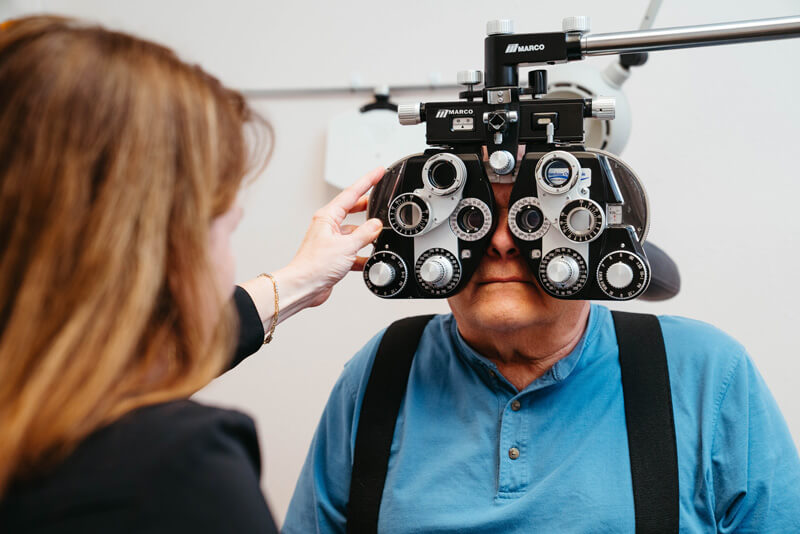Macular Degeneration
Untreated macular degeneration is one of the leading causes of blindness in those over 65 years old. While researchers have not yet discovered a cure for age-related macular degeneration (AMD), there are treatment options which prevent the disease from progressing to blindness, and in some cases, they can even improve vision. It’s important to have an open discussion with your eye doctor about the risks and limitations of AMD treatments.

Types of Macular Degeneration:
There are 2 basic types of AMD, the wet form, and the dry form.
Dry macular degeneration is considered the less aggressive form of AMD. It typically progresses much more slowly, and the level of eyesight damage is less severe. Dry AMD is detected during routine eye exams, which is why it’s important to have yearly testing. Treating Dry AMD often involves high doses of zinc and antioxidants which have been shown to slow disease progression.
Wet macular degeneration is the more severe form of AMD. It occurs when there is abnormal blood vessel growth (angiogenesis), and leakage, which can cause scar tissue to develop. Treatments include laser surgery, injecting light sensitive dyes, or AMD medication injected directly into the eye to inhibit angiogenesis.

Are You at Risk for Macular Degeneration?
Age-related macular degeneration (AMD) is a major concern for adults over the age 50 and reaching their senior years. Macular Degeneration is an incurable eye disease that only through prevention and annual eye exams with your eye doctor in New Tampa or Trinity, FL can ensure optimal eye health.
Although the condition is called age-related macular degeneration for the main risk factor is aging, yet many Floridians should be aware of other contributing factors that also lead to the development of AMD.
RISK FACTORS FOR AGE-RELATED MACULAR DEGENERATION CAN INCLUDE:Genes, Race, & Family’s Medical History: While Caucasians with light-colored irises may develop signs as early as 50, genetic makeup can also mean earlier progression of AMD. For instance, 20 genes were linked to age-related macular degeneration, which shows how much your family history can influence the risk of AMD.
Smoking: Among the many detrimental health risks caused by smoking, age-related macular degeneration is one of them. Unfortunately, the small cigarette boxes don’t highlight how awful smoking can affect your health negatively.
Eating Habits, Dieting, & Exercise: Maintaining a healthy weight and regular exercise will prevent the development of AMD, especially when you add lutein and zeaxanthin to your diet, such as by eating green leafy vegetables. Obesity or overweight will increase the risk of AMD.
For older patients who may have a medical history that includes heart disease, high blood pressure, or high cholesterol as well should know these are additional eye health risks.
AMD is an age-related eye disease that runs in families and is a leading cause of blindness in our aging population. There is no cure for this ocular disease, and AMD related vision loss is cannot usually be recovered. There are treatments, and preventative measures that can be taken, if detected early, so routine eye exams are essential.
Learn More About Macular Degeneration at True Eye Experts
If you have any questions about macular degeneration or would like a comprehensive eye exam to screen for macular degeneration, please call one of our locations or schedule an appointment online.
